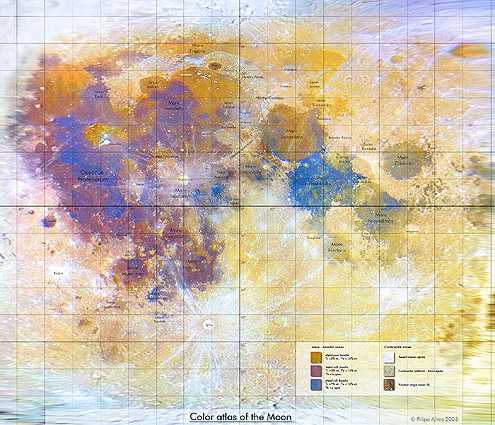Difference between revisions of "March 7, 2004"
| Line 14: | Line 14: | ||
<table width="100%" border="0" cellpadding="8"> | <table width="100%" border="0" cellpadding="8"> | ||
<tr> | <tr> | ||
| − | <td><div align="center | + | <td><div align="center"><p>Image Credit: [mailto:filipe@pixmix.tv Filipe Alves]</p></div></td> |
</tr> | </tr> | ||
</table> | </table> | ||
Revision as of 14:42, 18 January 2015
Color Moon Map
Image Credit: Filipe Alves |
|
Color Moon Map The Jan 28 ["../01/LPOD-2004-01-28.htm" LPOD] astonished many observers with its detailed color rendition of the Full Moon. Now that imager, Filipe Alves, has used advanced computer manipulation to create a Mercator-like projection color image of the Moon - the first I know of. This is a level of sophistication that is new to amateur Moon mapping. Here is what the color key at the bottom right says. Left column: Mare- basaltic zones: top gold button = metal poor basalts Ti <2% wt, Fe <15%. Second purple button = metal rich basalts Ti >3%, Fe >15%, Th <6 ppm. Third blue button = metal rich basalts Ti >7%, Fe >15%, Th <4 ppm. The right hand column is labeled Continental zones: top white button = recent impact ejecta, 2nd gray button: continental platform - basin ejecta. Bottom brown button = volcanic origin zones (?). Knowing the difficulty that professional astronomers have in calibrating their images to derive elemental abundances I assume that Filipe has simply calibrated his image against published images such as the map made from the Galileo flyby. Click the image above for a larger view of Filipe's wonderful map. Related Links: Tomorrow's LPOD: Sunset Over Clavius |
|
Author & Editor: Technical Consultant: A service of: |
COMMENTS?
Register, and click on the Discussion tab at the top of the page.




